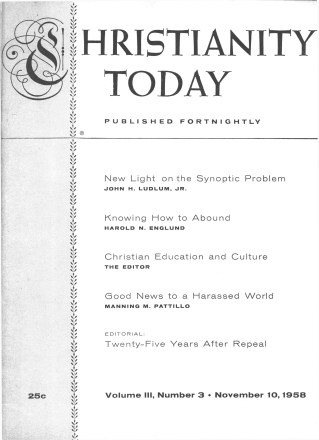Exposition And Doctrine
Luther’s Works, Vol. 1, Lectures on Genesis, Chapters 1–5, translated by George V. Schick (Concordia, 1958, 387 pp., $5), is reviewed by F. R. Webber, author of A History of Preaching.
Here is the first of a set of 55 good sized volumes that may well be one of the most significant publication projects of our generation. Several volumes have appeared recently, and others will be released at the rate of four a year.
There have been many editions of Luther’s collected writings, such as Weimar, 80 vols.; Wittenberg, 19 vols., Jena, 15 vols.; Altenberg, 11 vols.; Leipzig, 23 vols.; Walch, 24 vols.; Erlangen-Frankfurt, 102 vols.; Lenker, 13 vols.; St. Louis, 23 vols.; Holman, 6 vols. and Calwer, 6 vols. Of these, Weimar is by far the most scholarly. Most of these are in Latin and German. Single volumes are so numerous that the listing fills 105 double column pages, set in the smallest of type, in the British Museum’s 1946 catalogue.
The new 55-volume edition of Luther’s collected writings is an effort to make Luther speak in idiomatic English. They are based upon the Weimar edition of 1883 ff., whose 80 volumes, each the size of a pulpit Bible, fill eight shelves of standard public library size.
Lectures on Genesis, Chapters 1–5, will prove a revelation to readers who think of Luther as a defiant man, who shook his fist at popes and councils, and challenged them to prove their arguments by means of clear Scripture verses. In this series of expository lectures we meet with a genial Luther in his peaceful lecture room at Wittenberg University, with a Hebrew Bible before him, explaining the text in simple, winsome language.
Luther’s expositions of Genesis began on June 3, 1535 and ended January 18, 1544. They were delivered in Latin. Having reached Genesis 50:26, Luther laid aside his Latin notes and said: “Das ist nu der liebe Genesis. Unser Herr Gott geb, dases andere nach mir besser machen.” He died February 18, 1546, at the age of 63.
Luther expounded Genesis in Latin, verse by verse and word by word. Points of grammar are mentioned only when necessary to make the meaning clear, and there is no effort at display of his knowledge of Hebrew. The first dozen pages of Genesis 1–5 may prove unfamiliar ground to the reader, for Luther presents a summary of the curious notions of the universe, as taught by the philosophers of his day. Except for these opening pages, the style is delightfully simple and clear.
Luther wasted no time with speculation. He was convinced that the heavens and the earth were created just as the inspired words of Moses state, and that the entire work of creation, in which Father, Son and Holy Ghost all participated, was finished in six days. He admits again and again that there are details which he cannot understand, but he says, “I, therefore, take my reason captive and subscribe to the Word, even though I do not understand it” (p. 26).
The expositions of Genesis are more than a verse-by-verse commentary. Luther includes much doctrinal teaching: the Holy Trinity, the origin of all created things, the sin of Adam and its transmission to the entire human race, the deterioration of mankind and of all other created things because of sin, and the gracious plan of salvation through Jesus Christ. He mentions the redeeming work of the Saviour again and again. As a commentary the book is exegetical, doctrinal, devotional, homiletical and practical, and always in simple language that reads easily. A sample of Luther’s style may prove of interest:
“Now here, too, a sea of questions arises. Inquisitive people ask why God permitted Satan to tempt Eve. Furthermore, why Satan waylaid Eve through the serpent rather than through a different animal. But who can supply the reason for the things that he sees the Divine Majesty has permitted to happen? Why do we not rather learn with Job that God cannot be called to account and cannot be compelled to give us the reason for everything He does or permits to happen? Why do we not likewise register a complaint with God because the earth does not produce plants and because the trees are not green throughout the year? I am fully convinced that in Paradise there would have been perpetual spring without any winter, without snow or frosts, such as we have today after sin. But these are all things under the divine power and will. To know this is enough. Besides, it is wicked curiosity to investigate these problems in greater detail. Therefore let us, who are clay in His hands, cease to discuss such questions. Let us not sit in judgment on our God; let us rather be judged by Him” (p. 144).
The translator of the first volume of Luther’s Works is the Rev. Dr. George V. Schick, professor of Hebrew and Old Testament interpretation at Concordia Theological Seminary, St. Louis. Born in Chicago, Dr. Schick has studied at Johns Hopkins, Leipzig and Berlin. He taught Oriental history at Johns Hopkins, and later he taught Hebrew at Concordia College, Ft. Wayne, before taking up his present work at Concordia Seminary 20 years ago. He is author of two text books on biblical Hebrew, and served on the editorial board of the Lutheran Witness for 46 years.
Occasionally, in the other volumes of this series now in print (by other translators), the effort at idiomatic English is marred by clichés which seem strange in a serious theological or exegetical work. Fortunately these blemishes are rare, and they include such expressions as “he came up with,” “in this area,” and “on this level.” In a work of this scope, meaning, of course, the entire set of 55 volumes, which may become to the reader of English almost a Weimar edition, it might have proved more agreeable had the Authorized Version of 1611 been used uniformly throughout. The 1611 translation has survived about 500 revised Bibles and portions of Bibles, and it is difficult to believe that a version that translates logos as “expressed Himself” will prove more than a passing fad. Most of us can quote the 1611 version, and without the annoyance of having to explain our explanations. Our shelves of commentaries, concordances and numerous textual helps are based upon this version, and with its matchless beauty of language, it seems more in character with a 55-volume undertaking of Luther’s Works in English.
F. R. WEBBER
Women Of Scripture
She Shall be Called Woman by Frances Vander Velde (Grand Rapids International Publications, 258 pp., $2.95); and All of the Women of the Bible by Edith Deen (Harper, 410 pp., $4.95), is reviewed by Norma Ellis, wife and mother in a Presbyterian Manse.
It may seem that there are enough books based upon the women of the Bible that another would have nothing new or fresh to offer. But Mrs. Vander Velde, in gathering together these materials, which have been used in many study groups, has now offered for wider use a “gallery of character sketches” that deserve commendation.
Mrs. Vander Velde discloses in her Preface that she has had the “pleasure to become intimately acquainted with these women” and she succeeds in sharing this intimacy. In her book, 31 women-saints and sinners become flesh and blood. She presents enough background to disclose the problems they faced and the emotions they experienced. Then, by awaking an interest and by posing a number of pointed questions after each woman’s life, she presents the challenge to search the Scriptures further.
These “Suggestions for Discussion” contain, in addition to questions bearing directly on the Scripture, questions calculated to cause the reader to evaluate the behavior or motive of these Bible characters and sometimes of contemporary Christendom. This practical application, appropriate particularly to women, is what chiefly makes this book excellent for study and discussion groups.
Mrs. Vander Velde’s own unquestioning belief in the Bible as the inspired Word of God gives the book the ring of certainty. At one point, however, one wishes she were less dogmatic with reference to a question upon which conservative scholars do not take a united stand: namely, her identity of Salome, wife of Zebedee, as the sister of Mary, the mother of Jesus.
A second study book on women of the Bible is All of the Women of the Bible by Edith Deen. Anyone desiring to do serious study on the women of the Bible would of necessity consult this book. It is unique in its field because of its completeness.
Mrs. Deen groups all of the women of the Bible in various sections and then has a helpful index. Her book contains “316 concise biographies, including 25 searching studies of women in the foreground, more than 125 shorter sketches of named women and more than 125 sketches of nameless women in the background.” The sketches vary in length from 12 pages to one sentence. Among the short ones are found such women as the nurse who let Mephibosheth fall and a silly woman mentioned in 2 Timothy 3:6, 7.
Unlike Mrs. Vander Velde’s book, this one presents arguments from several points of view, by no means all conservative. In her discussion concerning Salome, for instance, she speaks of her son John in this wise: “He may have written the Fourth Gospel, though some scholars question this.”
Edith Deen is well known as a writer and commentator on women’s affairs. Several years ago she ran a series of articles in her newspaper column on “Great Women of the Bible.” It was the tremendous response to this series that led into further research, in which her Mayor husband joined, resulting in this book.
Although it lacks the ring of personal conviction that attracts the Christian reader to Mrs. Vander Velde’s book, its fine presentation and the extensive research that went into it cause it to be very valuable for the church or pastor’s library.
NORMA R. ELLIS










